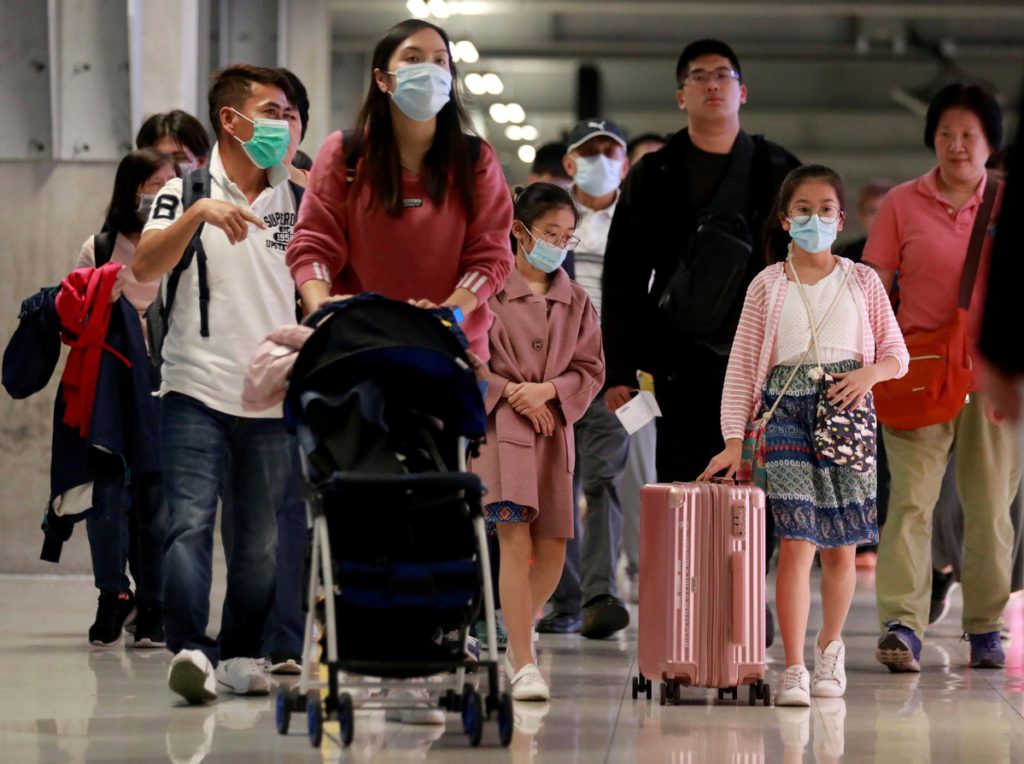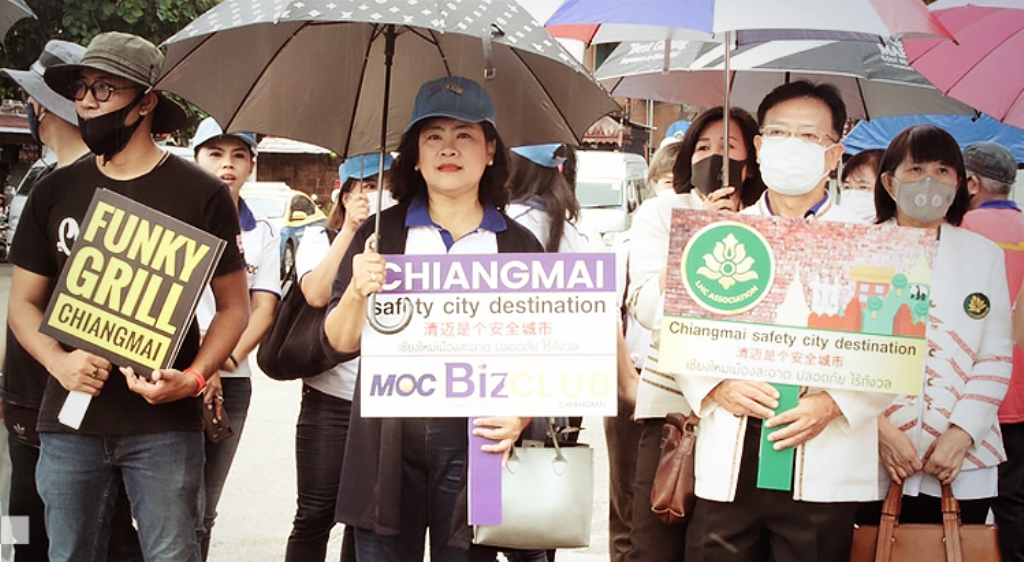News
Thailand Prepares for Chinese in 2023 as Russian Arrivals Increase

Thailand has seen a surge in Russian visitors, with monthly arrivals doubling in November and nearly seven times higher than in September, far outpacing increases in other countries in the run-up to peak travel season.
The country is experiencing a much-needed tourism boom, with 1.75 million visitors in November, more than quadrupling the number received for the entire year last year, when flights and foreign arrivals were limited due to the pandemic.
According to official data, the government removed the last vestige of its strict Covid-19 entry policies in July to revive the collapsed tourism sector, and since September, Russian arrivals have grown at a faster monthly rate than any other country, including those arising from low bases.
Before the pandemic, Russia was Thailand’s seventh-largest tourism market, with 1.48 million visitors in 2019, but every month in November, it was third behind Malaysia and India, with 108,985 arrivals, up from 44,314 in October and 15,900 in September.
In comparison, Malaysian arrivals fell steadily from 332,493 in September to 258,873 in November, while Indian visitors increased each month incrementally from 116,386 in September to 145,628 in November.

Russian visitors in November accounted for roughly 60% of those who visited in the same month in 2019.
“This year has seen a return of the Russian market, particularly following the Ukraine conflict,” said Stuart Reading, deputy CEO of Laguna Resorts and Hotels.
He credited the strengthening of the rouble against the baht and his chain’s hiring of some Russian-speaking personnel.
This year, the rouble has been one of the best-performing major currencies against the US dollar.
On average, Russian visitors stay for seven to ten nights, while “snowbirds” escaping the harsh winter back home can stay for up to three months.
According to Yuthasak Supasorn, governor of Thailand’s Tourism Authority, Russians make up about a quarter of the island’s visitors, helped by direct flights between Phuket and Bangkok.
“We’re seeing Russian families renting homes and staying from 16 days to a few months,” said Bhummikitti Ruktaengam, advisory chairman of Phuket’s Tourist Association.
“You’ll see Russian families strolling in the park with locals in the evening,” he said, adding that some were staying until March.
According to the TAT, total arrivals could exceed 11.5 million by year’s end, just over a quarter of the record of nearly 40 million in 2019, who spent approximately 1.91 trillion baht.

Thailand Prepares for Chinese Tourists
Meanwhile, the government is preparing to welcome back Chinese tourists after Beijing decided to ease travel restrictions earlier than expected.
On Wednesday, Transport Minister Saksayam Chidchob said he and Tourism and Sports Minister Phiphat Ratchakitprakarn had been invited to a meeting with the Public Health Ministry at Government House on January 5 to prepare for the return of Chinese tourists.
Mr. Saksayam also stated that the Ministry of Public Health is coordinating with the Chinese embassy to obtain information about China’s reopening to help prepare travel measures.
He expressed confidence in the Ministry of Public Health’s ability to handle the Covid-19 crisis.
Furthermore, he said that the return of Chinese tourists is expected to be gradual.
He said the Civil Aviation Authority of Thailand (CAAT) and the Aeronautical Radio of Thailand (Aerothai) are gathering information about the number of flights and tourists for the Transport Ministry, and the ministry has about a week to make plans.
Airlines are expected to file requests with Airports of Thailand (AoT) before the New Year holidays, and flights to Bangkok, Chiang Mai, and Phuket are expected to resume initially. Charter flights are also expected during Chinese New Year, according to him.

7-10 Million Chinese Tourists
He has directed airports to increase ground handling capacity to avoid unnecessary delays or inconvenience. The number of Chinese travelers using AoT-operated airports is expected to be around 7-10 million next year, compared to the pre-Covid figure of 20.5 million.
Mr. Saksayam paid a visit to Suvarnabhumi Airport on Wednesday afternoon, ahead of the New Year rush, and inquired about the airport’s readiness to return Chinese visitors.
Traisulee Taisaranakul, a deputy government spokeswoman, said the government is closely monitoring China’s reopening.
She stated that the Ministries of Foreign Affairs, Public Health, Transport, and Tourism and Sports would be informed of new developments as they become available.
“This is to ensure that Thailand is ready to welcome Chinese visitors,” she explained.
Following China’s reopening, people close to Thailand’s tourism and travel sector estimate that the number of international visitors in 2023 will be 25 million rather than the 20 million predicted.
Thailand’s Tourism Authority predicts 20 million visitors next year. Before Covid, Chinese tourists accounted for 30% of international arrivals or approximately 11 million in 2019.

Vaccinations Ahead of Tourist Surge
Meanwhile, Nanthakarn Suwanpidokkul, deputy director of the Government Pharmaceutical Organization (GPO), stated that the GPO had developed its antiviral drug, molnupiravir, to treat Covid-19.
She stated that the GPO has begun producing the drug, increasing the country’s supply of antiviral drugs and people’s access to affordable treatment. Molnupiravir has so far been obtained from outside the country, she added.
She stated that locally produced molnupiravir will be distributed to hospitals this week and that patients with prescriptions can purchase the drug at any GPO drug store.
Prime Minister Prayut Chan-o-cha has welcomed airlines’ decision to reduce airfares by 20% beginning in January, following the government’s decision to reduce the excise tax on jet fuel to 20 satangs per liter to boost tourism.
Anucha Burapachaisri, a government spokesman, said Gen Prayut was pleased to learn of the Thai Airline Association’s decision and thanked them for assisting the government in stimulating travel and local consumption and reviving the economy. In January, all seven airlines will run promotions with airfares reduced by up to 20%.
In preparation for the return of Chinese tourists, the Tourism and Sports Ministry hopes to provide Covid-19 booster shots to tourists and Thai tourism workers.
Tourism and Sports Minister Phiphat Ratchakitprakarn said the investment would be worthwhile because vaccine prices have dropped to a few hundred baht per shot.
Mr. Phiphat stated that if the average tourist spent 40,000 baht and 7% VAT was collected, the value would exceed the vaccine prices.
“It will help Thailand’s image because we are ranked among the top nations for healthcare security,” he said.
Mr. Phiphat stated that the Tourism and Sports Ministry would investigate the feasibility of this idea in collaboration with the Tourism Authority of Thailand and the Public Health Ministry.
He said that if the government approves the scheme, funds should be allocated to the Public Health Ministry to purchase vaccines.

News
Google’s Search Dominance Is Unwinding, But Still Accounting 48% Search Revenue

Google is so closely associated with its key product that its name is a verb that signifies “search.” However, Google’s dominance in that sector is dwindling.
According to eMarketer, Google will lose control of the US search industry for the first time in decades next year.
Google will remain the dominant search player, accounting for 48% of American search advertising revenue. And, remarkably, Google is still increasing its sales in the field, despite being the dominating player in search since the early days of the George W. Bush administration. However, Amazon is growing at a quicker rate.
Google’s Search Dominance Is Unwinding
Amazon will hold over a quarter of US search ad dollars next year, rising to 27% by 2026, while Google will fall even more, according to eMarketer.
The Wall Street Journal was first to report on the forecast.
Lest you think you’ll have to switch to Bing or Yahoo, this isn’t the end of Google or anything really near.
Google is the fourth-most valued public firm in the world. Its market worth is $2.1 trillion, trailing just Apple, Microsoft, and the AI chip darling Nvidia. It also maintains its dominance in other industries, such as display advertisements, where it dominates alongside Facebook’s parent firm Meta, and video ads on YouTube.
To put those “other” firms in context, each is worth more than Delta Air Lines’ total market value. So, yeah, Google is not going anywhere.
Nonetheless, Google faces numerous dangers to its operations, particularly from antitrust regulators.
On Monday, a federal judge in San Francisco ruled that Google must open up its Google Play Store to competitors, dealing a significant blow to the firm in its long-running battle with Fortnite creator Epic Games. Google announced that it would appeal the verdict.
In August, a federal judge ruled that Google has an illegal monopoly on search. That verdict could lead to the dissolution of the company’s search operation. Another antitrust lawsuit filed last month accuses Google of abusing its dominance in the online advertising business.
Meanwhile, European regulators have compelled Google to follow tough new standards, which have resulted in multiple $1 billion-plus fines.

Pixa Bay
Google’s Search Dominance Is Unwinding
On top of that, the marketplace is becoming more difficult on its own.
TikTok, the fastest-growing social network, is expanding into the search market. And Amazon has accomplished something few other digital titans have done to date: it has established a habit.
When you want to buy anything, you usually go to Amazon, not Google. Amazon then buys adverts to push companies’ products to the top of your search results, increasing sales and earning Amazon a greater portion of the revenue. According to eMarketer, it is expected to generate $27.8 billion in search revenue in the United States next year, trailing only Google’s $62.9 billion total.
And then there’s AI, the technology that (supposedly) will change everything.
Why search in stilted language for “kendall jenner why bad bunny breakup” or “police moving violation driver rights no stop sign” when you can just ask OpenAI’s ChatGPT, “What’s going on with Kendall Jenner and Bad Bunny?” in “I need help fighting a moving violation involving a stop sign that wasn’t visible.” Google is working on exactly this technology with its Gemini product, but its success is far from guaranteed, especially with Apple collaborating with OpenAI and other businesses rapidly joining the market.
A Google spokeswoman referred to a blog post from last week in which the company unveiled ads in its AI overviews (the AI-generated text that appears at the top of search results). It’s Google’s way of expressing its ability to profit on a changing marketplace while retaining its business, even as its consumers steadily transition to ask-and-answer AI and away from search.

Google has long used a single catchphrase to defend itself against opponents who claim it is a monopoly abusing its power: competition is only a click away. Until recently, that seemed comically obtuse. Really? We are going to switch to Bing? Or Duck Duck Go? Give me a break.
But today, it feels more like reality.
Google is in no danger of disappearing. However, every highly dominating company faces some type of reckoning over time. GE, a Dow mainstay for more than a century, was broken up last year and is now a shell of its previous dominance. Sears declared bankruptcy in 2022 and is virtually out of business. US Steel, long the foundation of American manufacturing, is attempting to sell itself to a Japanese corporation.
SOURCE | CNN
News
2024 | Supreme Court Won’t Hear Appeal From Elon Musk’s X Platform Over Warrant In Trump Case

Washington — Trump Media, The Supreme Court announced Monday that it will not hear an appeal from social media platform X about a search warrant acquired by prosecutors in the election meddling case against former President Donald Trump.
The justices did not explain their rationale, and there were no recorded dissents.
The firm, which was known as Twitter before being purchased by billionaire Elon Musk, claims a nondisclosure order that prevented it from informing Trump about the warrant obtained by special counsel Jack Smith’s team violated its First Amendment rights.
The business also claims Trump should have had an opportunity to exercise executive privilege. If not reined in, the government may employ similar tactics to intercept additional privileged communications, their lawyers contended.
Supreme Court Won’t Hear Appeal From Elon Musk’s X Platform Over Warrant In Trump Case
Two neutral electronic privacy groups also joined in, urging the high court to hear the case on First Amendment grounds.
Prosecutors, however, claim that the corporation never shown that Trump utilized the account for official purposes, therefore executive privilege is not a problem. A lower court also determined that informing Trump could have compromised the current probe.

Trump utilized his Twitter account in the weeks preceding up to his supporters’ attack on the Capitol on January 6, 2021, to spread false assertions about the election, which prosecutors claim were intended to create doubt in the democratic process.
The indictment describes how Trump used his Twitter account to encourage his followers to travel to Washington on Jan. 6, pressuring Vice President Mike Pence to reject the certification, and falsely claiming that the Capitol crowd, which battered police officers and destroyed glass, was peaceful.
Supreme Court Won’t Hear Appeal From Elon Musk’s X Platform Over Warrant In Trump Case
That case is now moving forward following the Supreme Court’s verdict in July, which granted Trump full immunity from criminal prosecution as a former president.
The warrant arrived at Twitter amid quick changes implemented by Musk, who bought the company in 2022 and has since cut off most of its workforce, including those dedicated to combating disinformation and hate speech.
SOURCE | AP
News
The Supreme Court Turns Down Biden’s Government Appeal in a Texas Emergency Abortion Matter.

(VOR News) – A ruling that prohibits emergency abortions that contravene the Supreme Court law in the state of Texas, which has one of the most stringent abortion restrictions in the country, has been upheld by the Supreme Court of the United States. The United States Supreme Court upheld this decision.
The justices did not provide any specifics regarding the underlying reasons for their decision to uphold an order from a lower court that declared hospitals cannot be legally obligated to administer abortions if doing so would violate the law in the state of Texas.
Institutions are not required to perform abortions, as stipulated in the decree. The common populace did not investigate any opposing viewpoints. The decision was made just weeks before a presidential election that brought abortion to the forefront of the political agenda.
This decision follows the 2022 Supreme Court ruling that ended abortion nationwide.
In response to a request from the administration of Vice President Joe Biden to overturn the lower court’s decision, the justices expressed their disapproval.
The government contends that hospitals are obligated to perform abortions in compliance with federal legislation when the health or life of an expectant patient is in an exceedingly precarious condition.
This is the case in regions where the procedure is prohibited. The difficulty hospitals in Texas and other states are experiencing in determining whether or not routine care could be in violation of stringent state laws that prohibit abortion has resulted in an increase in the number of complaints concerning pregnant women who are experiencing medical distress being turned away from emergency rooms.
The administration cited the Supreme Court’s ruling in a case that bore a striking resemblance to the one that was presented to it in Idaho at the beginning of the year. The justices took a limited decision in that case to allow the continuation of emergency abortions without interruption while a lawsuit was still being heard.
In contrast, Texas has been a vocal proponent of the injunction’s continued enforcement. Texas has argued that its circumstances are distinct from those of Idaho, as the state does have an exemption for situations that pose a significant hazard to the health of an expectant patient.
According to the state, the discrepancy is the result of this exemption. The state of Idaho had a provision that safeguarded a woman’s life when the issue was first broached; however, it did not include protection for her health.
Certified medical practitioners are not obligated to wait until a woman’s life is in imminent peril before they are legally permitted to perform an abortion, as determined by the state supreme court.
The state of Texas highlighted this to the Supreme Court.
Nevertheless, medical professionals have criticized the Texas statute as being perilously ambiguous, and a medical board has declined to provide a list of all the disorders that are eligible for an exception. Furthermore, the statute has been criticized for its hazardous ambiguity.
For an extended period, termination of pregnancies has been a standard procedure in medical treatment for individuals who have been experiencing significant issues. It is implemented in this manner to prevent catastrophic outcomes, such as sepsis, organ failure, and other severe scenarios.
Nevertheless, medical professionals and hospitals in Texas and other states with strict abortion laws have noted that it is uncertain whether or not these terminations could be in violation of abortion prohibitions that include the possibility of a prison sentence. This is the case in regions where abortion prohibitions are exceedingly restrictive.
Following the Supreme Court’s decision to overturn Roe v. Wade, which resulted in restrictions on the rights of women to have abortions in several Republican-ruled states, the Texas case was revisited in 2022.
As per the orders that were disclosed by the administration of Vice President Joe Biden, hospitals are still required to provide abortions in cases that are classified as dire emergency.
As stipulated in a piece of health care legislation, the majority of hospitals are obligated to provide medical assistance to patients who are experiencing medical distress. This is in accordance with the law.
The state of Texas maintained that hospitals should not be obligated to provide abortions throughout the litigation, as doing so would violate the state’s constitutional prohibition on abortions. In its January judgment, the 5th United States Circuit Court of Appeals concurred with the state and acknowledged that the administration had exceeded its authority.
SOURCE: AP
SEE ALSO:
Could Last-Minute Surprises Derail Kamala Harris’ Campaign? “Nostradamus” Explains the US Poll.
-

 News4 years ago
News4 years agoLet’s Know About Ultra High Net Worth Individual
-
Entertainment2 years ago
Mabelle Prior: The Voice of Hope, Resilience, and Diversity Inspiring Generations
-
News11 years ago
Enviromental Groups Tell Mekong Leaders Lao Dam Evaluation Process Flawed
-

 Health4 years ago
Health4 years agoHow Much Ivermectin Should You Take?
-

 Tech3 years ago
Tech3 years agoTop Forex Brokers of 2023: Reviews and Analysis for Successful Trading
-

 Lifestyles3 years ago
Lifestyles3 years agoAries Soulmate Signs
-

 Entertainment3 years ago
Entertainment3 years agoWhat Should I Do If Disney Plus Keeps Logging Me Out of TV?
-

 Health3 years ago
Health3 years agoCan I Buy Ivermectin Without A Prescription in the USA?


